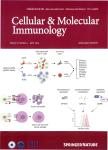Tempering of exhausted T cells to comprehend their adaptive response for suitable clinical translation
作者机构:Department of Integrated OncologyCenter for Integrated Oncology(CIO)BonnUniversity Hospital BonnBonnGermany
出 版 物:《Cellular & Molecular Immunology》 (中国免疫学杂志(英文版))
年 卷 期:2023年第20卷第12期
页 面:1401-1402页
核心收录:
学科分类:1002[医学-临床医学] 1001[医学-基础医学(可授医学、理学学位)] 100214[医学-肿瘤学] 10[医学]
基 金:Projekt DEAL
主 题:irreversible exhaustion publications
摘 要:Although cancer immunotherapy has taken center stage,exhaustion of T cells is undeniably one of the major problems preventing it from being fully successful[1].Certainly,reversal of T-cell exhaustion or dysfunction is of great importance for developing new strategies and restoring immune ***,counterarguments about the adverse effect of reversing T-cell exhaustion(leading to overactivation of T cells and cytotoxicity)and even their irreversible properties have been quite common in scientific *** more to be discovered about the reasons for T-cell failure,a better understanding of the molecular factors/determinants[2,3]that shape/remodel“heterogeneousdysfunctional T cells in cancer makes clear ***,two recent publications in Nature immunology have described the intriguing perspective of T-cell exhaustion[4,5].Of interest,Vignali et *** on the hypoxia-driven CD39-dependent suppressor function of exhausted T cells,whereas Saadey et *** restoring the epigenetic balance of TGFβ1/BMP signaling in exhausted T cells to unlock responsiveness to immune checkpoint blockade therapy.



